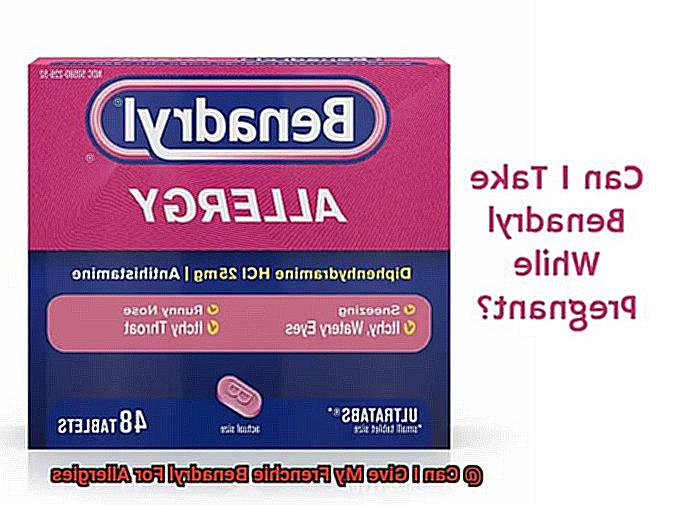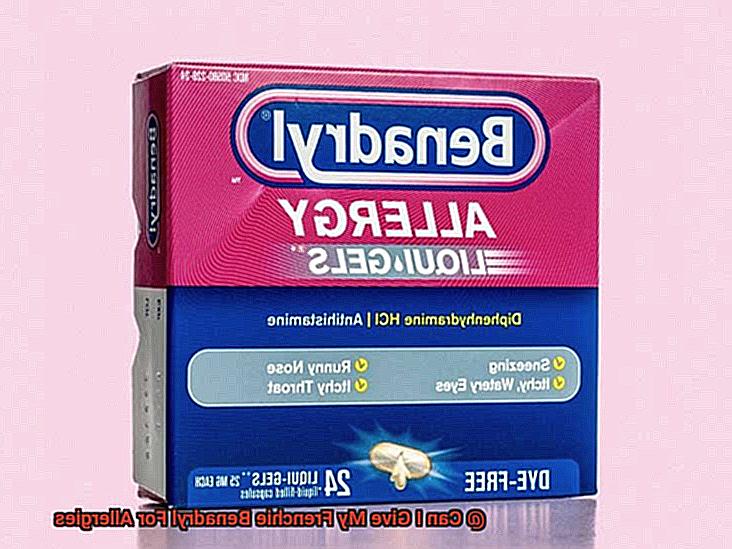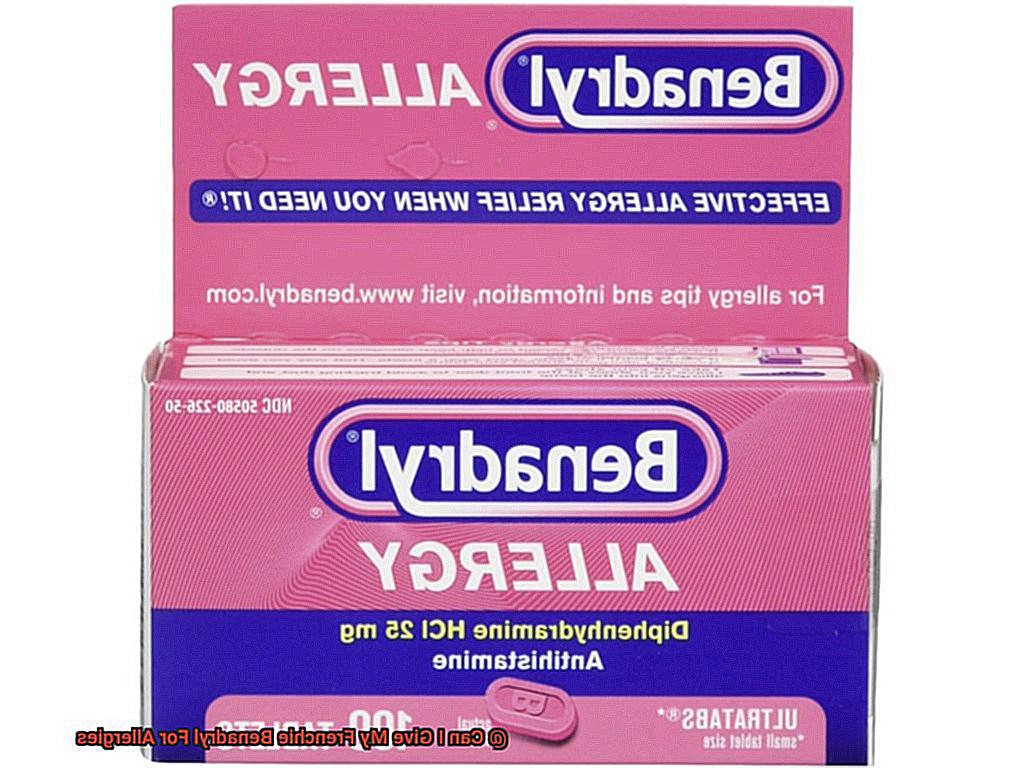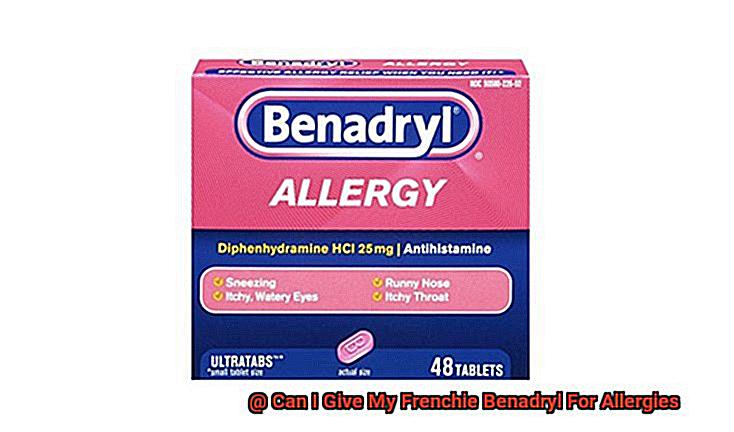Can I Give My Frenchie Benadryl For Allergies?
We all know these little bundles of joy can steal our hearts with their quirky personalities and smushy faces. But just like us humans, our furry friends can also suffer from pesky allergies that make them itch like crazy. So, the burning question on your mind might be: can I give my Frenchie some good ol’ Benadryl to ease their discomfort?
Well, fear not. In this blog post, we’re diving deep into the world of French Bulldogs and Benadryl. We’ll explore whether it’s safe to dish out this antihistamine to your four-legged pal, how it can help with those sneezy woes, and what precautions you need to take. But hold your horses (or should we say bulldogs), before you reach for that pill bottle, remember to consult with your vet first. They’re the real experts who know what’s best for your Frenchie’s unique needs.
So, sit back, relax, and let’s uncover the truth about giving Benadryl to our adorable Frenchies. It’s time to put those allergies in their place and bring back the wagging tails and happy snorts.
Can French Bulldogs Have Allergies?
Contents
- 1 Can French Bulldogs Have Allergies?
- 2 Why Should You Consult Your Veterinarian Before Giving Benadryl to Your Frenchie?
- 3 What Are the Dosage and Safety Considerations for Benadryl in French Bulldogs?
- 4 How Can a Veterinarian Help with Treating Your Frenchie’s Allergies?
- 5 What Are the Potential Side Effects of Benadryl in Dogs?
- 6 Could Underlying Health Conditions or Other Medications Interfere with Benadryl?
- 7 Is Benadryl the Best Treatment Option for My Frenchie’s Allergies?
- 8 What Alternatives to Benadryl are Available for French Bulldogs with Allergies?
- 9 Conclusion
These symptoms could be indications that your beloved Frenchie is suffering from allergies. Just like humans, French Bulldogs can develop allergies to various substances, including environmental allergens and certain foods. In this blog post, we will explore the causes and treatments for allergies in French Bulldogs, offering insights to help your Frenchie find relief.
Identifying the Allergen:
The first step in managing your Frenchie’s allergies is identifying the specific allergen causing the reaction. This can be challenging, as allergies can be triggered by a wide range of substances. Common culprits include pollen, dust mites, mold, certain foods (e.g., chicken or grains), and even certain grooming products. Consulting with a veterinarian is essential to pinpoint the specific allergen and develop an appropriate treatment plan.
Diagnosis and Treatment Options:
To diagnose your Frenchie’s allergies, the veterinarian may perform a thorough examination and recommend additional tests, such as blood tests or skin allergy testing. Once the allergen is identified, various treatment options can be considered:
- Antihistamines: In some cases, antihistamines like Benadryl can help alleviate allergy symptoms in French Bulldogs. However, it is crucial to consult with your veterinarian before administering any medication. They will determine the appropriate dosage based on your Frenchie’s weight and overall health condition.
- Topical Treatments: For skin allergies, your veterinarian may recommend topical creams or shampoos to relieve itching and inflammation. These products are designed specifically for dogs and can provide targeted relief.
- Hypoallergenic Diet: If food allergies are suspected, switching to a hypoallergenic diet may be necessary. This involves feeding your Frenchie a specially formulated diet that avoids common allergens. Your veterinarian can guide you in selecting the most suitable diet for your Frenchie’s needs.
Preventing Allergies:
While allergies cannot always be prevented, there are steps you can take to minimize your Frenchie’s exposure to potential allergens:
- Regular Cleaning: Keep your home clean and dust-free to reduce exposure to environmental allergens. Vacuum frequently, wash bedding regularly, and consider using air purifiers.
- Allergen-Free Grooming: Use grooming products that are specifically formulated for dogs with allergies or sensitive skin. Avoid products containing potential allergens, such as fragrances or harsh chemicals.
- Limited Exposure: If certain environmental allergens are identified as triggers, try to limit your Frenchie’s exposure by avoiding areas with high pollen counts or keeping them indoors during peak allergy seasons.
Why Should You Consult Your Veterinarian Before Giving Benadryl to Your Frenchie?
When it comes to addressing their allergies, you may have heard that Benadryl, an over-the-counter antihistamine, can provide relief. However, before reaching for that bottle of Benadryl, it is crucial to consult your veterinarian. Here’s why:
- Unique Physiology: Dogs, including French Bulldogs, have different physiological reactions to medications compared to humans. What may be safe for us can potentially be harmful to our furry friends. Consulting your veterinarian ensures that the medication is appropriate for your Frenchie’s specific needs.
- Breed Sensitivities: French Bulldogs are known to have certain health issues and sensitivities, including allergies. While Benadryl may seem like a logical solution, consulting a veterinarian allows them to assess your Frenchie’s specific condition and consider any breed-specific sensitivities or risks associated with the medication.
- Individual Factors: Your veterinarian takes into account various factors such as your Frenchie’s age, weight, overall health, and any preexisting medical conditions. Certain health conditions in French Bulldogs, such as respiratory problems or heart disease, can be exacerbated by antihistamines like Benadryl. Your veterinarian can determine if Benadryl is safe for your Frenchie or recommend alternative treatment options.
- Correct Dosage: Giving the wrong dosage of Benadryl can be ineffective or even harmful to your Frenchie’s health. Your veterinarian will determine the appropriate dosage based on your dog’s individual needs, ensuring their safety and well-being.
- Potential Interactions: Some medications or health conditions may interact negatively with Benadryl, leading to potential complications. Veterinarians have the expertise to identify any potential interactions and provide guidance on the safe use of medications.
- Addressing the Root Cause: While Benadryl can provide temporary relief from allergy symptoms, it does not address the underlying cause of the allergies. Your veterinarian can help identify and address the root cause through proper diagnosis and treatment, ensuring long-term relief for your Frenchie.
What Are the Dosage and Safety Considerations for Benadryl in French Bulldogs?

Just like any other dog breed, Frenchies can suffer from allergies that make them itchy, uncomfortable, and downright miserable. That’s where Benadryl comes in – a widely used medication to help relieve their allergy symptoms. But before you start popping pills like candy, let’s take a closer look at the dosage and safety considerations for Benadryl in French Bulldogs.
Dosage Guidelines:
When it comes to the right dosage of Benadryl for your Frenchie, weight is the name of the game. The general rule of thumb is 1 mg of Benadryl per pound of body weight. So if your Frenchie weighs 20 pounds, they would typically need a 20 mg dose.
But hold your horses. Always check with your vet before administering any medication. They will consider your Frenchie’s age, weight, and overall health to determine the most appropriate dosage. Remember, every dog is unique, and what works for one Frenchie may not work for another.
Safety First:
Here are some safety considerations to keep in mind when using Benadryl for your Frenchie:
- Consult Your Vet: Always consult with your veterinarian before giving any medication to your Frenchie. They will provide guidance on the correct dosage and any potential risks or interactions with other medications.
- Choose the Right Formulation: Benadryl comes in various formulations such as tablets or liquid. Make sure you choose a formulation meant for dogs and carefully follow the instructions on the label.
- Monitor Brachycephalic Airway Syndrome (BAS): French Bulldogs are susceptible to BAS, a condition that affects their breathing. Benadryl can have sedative effects, so closely monitor your Frenchie after giving them the medication. If you notice any breathing difficulties, seek immediate veterinary attention.
- Side Effects: Common side effects of Benadryl in dogs include drowsiness, dry mouth, and urinary retention. While these are generally mild, it’s essential to keep an eye out for any severe or unusual reactions and contact your vet if concerned.
- No DIY Combos: Stick to plain Benadryl without any added active ingredients like decongestants or pain relievers. These can be harmful to your Frenchie.

How Can a Veterinarian Help with Treating Your Frenchie’s Allergies?
French Bulldogs, or Frenchies as they are affectionately known, are a popular breed that bring joy and companionship to many households. However, like all dogs, Frenchies can suffer from allergies that can cause discomfort and distress. If your Frenchie is experiencing allergy symptoms, a veterinarian can be an invaluable resource in diagnosing and managing the condition.
Thorough Examination and Diagnosis
One of the first steps a veterinarian will take is conducting a thorough examination of your Frenchie to rule out any other underlying health issues that could be causing or exacerbating the allergies. They may ask questions about your dog’s symptoms, diet, environment, and medical history to gather relevant information. This comprehensive approach is crucial in accurately diagnosing and treating the allergies.
Allergy Testing
In some cases, your veterinarian may recommend allergy testing to identify the specific allergens causing your Frenchie’s symptoms. This can be done through blood tests or skin tests. Identifying the specific allergens allows for targeted treatment and management strategies.
Treatment Options
Once the allergens are identified, your veterinarian can then work with you to develop an appropriate treatment plan for your Frenchie. Treatment options may vary depending on the severity of the symptoms and the specific allergens involved.
Lifestyle Changes
In many cases, lifestyle changes can help manage your Frenchie’s allergies. Your veterinarian may recommend modifying your dog’s diet or removing potential allergens from their environment. They can provide guidance on hypoallergenic diets and suggest ways to reduce exposure to common allergens such as pollen or dust mites.
Medications
Medications can also be prescribed by your veterinarian to help manage your Frenchie’s allergy symptoms. These may include antihistamines, steroids, or immune-modulating drugs. It is important to consult with your veterinarian before giving any over-the-counter medications like Benadryl to your Frenchie. The dosage and potential side effects need to be considered, as well as any interactions with other medications your dog may be taking.
Regular Follow-up Visits
Regular follow-up visits with your veterinarian are essential to monitor your Frenchie’s progress and make any necessary adjustments to the treatment plan. This ensures that your dog’s allergies are properly managed and helps prevent any potential complications or flare-ups.
Specialized Care

In some cases, your veterinarian may refer you to a veterinary dermatologist or allergist for specialized care and treatment options. These specialists have additional training and expertise in managing complex or severe allergy cases in dogs.
What Are the Potential Side Effects of Benadryl in Dogs?
Dealing with your fur baby’s allergies can be a real itch, but fear not – Benadryl might just come to the rescue. Before you reach for that bottle of diphenhydramine, though, it’s important to know about the possible side effects that could affect your French Bulldog. Let’s dive into the potential pitfalls of using Benadryl in dogs, so you can be well-informed and keep your pup safe.
Drowsiness: Proceed with Caution
Just like a lazy Sunday afternoon snooze, Benadryl can make your Frenchie feel drowsy or lethargic. While it’s usually harmless, keep an eye on your pup to ensure they don’t become overly sedated. After all, we want them bright-eyed and bushy-tailed.
Upset Tummy Troubles

Oh no, did someone say vomit and diarrhea? Yes, unfortunately, some dogs may experience gastrointestinal upset after taking Benadryl. Keep an eye out for any signs of tummy troubles and consult your vet if it becomes a recurring issue.
Allergic Reactions: A Rare but Serious Concern
Just like humans can have allergies to certain medications, our Frenchies are not immune either. In rare cases, Benadryl can cause allergic reactions in dogs. If you notice swelling of the face or throat, difficulty breathing, hives, or collapse – don’t hesitate. Rush your furry friend to the vet immediately.
Certain Breeds at Higher Risk
Hey there, Boxers and Bulldogs. You guys need to pay extra attention here. Certain breeds like yours have been reported to be more prone to side effects from Benadryl, especially respiratory issues. Keep a close eye on your brachycephalic buddies and consult your vet before reaching for the diphenhydramine.
Pre-existing Conditions and Medication Interactions
If your Frenchie has any pre-existing medical conditions or is taking other medications, it’s crucial to consult with your vet before administering Benadryl. Some conditions or medications may increase the risk of side effects or interact negatively with diphenhydramine. Safety first, fur parents.
Overdosing Dangers: Stay Within the Limits
Remember, more is not always merrier. Overdosing on Benadryl can have serious consequences for our furry friends. Stick to the recommended dosage guidelines provided by your vet and never exceed the prescribed amount. Let’s keep our Frenchies safe and sound.
Could Underlying Health Conditions or Other Medications Interfere with Benadryl?
When it comes to treating your French Bulldog’s allergies, Benadryl can be a real lifesaver. However, it’s important to consider any underlying health conditions or medications that your Frenchie may have. Let’s dive into how these factors could potentially interfere with the use of Benadryl.
Underlying Health Conditions: Proceed with Caution.
French Bulldogs, like any other breed, can have underlying health issues that may complicate the use of Benadryl. Conditions such as heart disease, high blood pressure, glaucoma, and urinary retention can be contraindications for using this medication. It’s crucial to have a conversation with your veterinarian before administering Benadryl to your Frenchie.
Medications and Benadryl: A Delicate Balance
If your French Bulldog is currently taking any other medications, it’s essential to inform your vet. Some medications can interact with Benadryl and cause adverse effects. Your veterinarian will be able to advise you on whether there are any potential interactions that you need to be aware of.
Alternative Options: Tailoring Treatment for Your Frenchie
In some cases, if your French Bulldog has underlying health conditions or is taking medications that could interfere with Benadryl, alternative allergy medications may be recommended. Your vet might suggest a different antihistamine or even create a specialized treatment plan tailored to your dog’s specific needs.
Dosage Matters: Trust Your Vet’s Expertise
Giving your Frenchie the correct dosage of Benadryl is crucial. Weight and condition play a significant role in determining the appropriate dosage. Your vet will be able to calculate the right amount for your furry friend.
Watch Out for Warning Signs
While Benadryl is generally safe for dogs, including French Bulldogs, it’s important to keep an eye out for any unusual or adverse reactions. Excessive drowsiness, vomiting, diarrhea, or difficulty breathing could be signs of an allergic reaction or an adverse interaction with other medications. If you notice any of these symptoms, contact your veterinarian immediately.
The Bottom Line: Consult Your Vet
Remember, every dog is unique, and what works for one Frenchie may not work for another. Always consult with your veterinarian before giving any medication to your French Bulldog, especially if they have underlying health conditions or are taking other medications. Your vet will be able to provide personalized advice and ensure the safety and well-being of your furry friend.
Is Benadryl the Best Treatment Option for My Frenchie’s Allergies?
French Bulldogs are known for their adorable wrinkled faces and playful personalities. However, just like humans, they can suffer from allergies that can cause discomfort and affect their quality of life. One commonly recommended treatment option is Benadryl, an antihistamine medication. While Benadryl can provide relief for certain allergy symptoms in dogs, it may not always be the best choice for every Frenchie. In this article, we will explore the factors to consider when deciding if Benadryl is the right treatment option for your Frenchie’s allergies.
Factors to Consider:
- Allergy Symptoms: French Bulldogs can experience a range of allergy symptoms, including skin irritations, itchiness, sneezing, and respiratory difficulties. It is crucial to assess the specific symptoms your dog is experiencing and consult with a veterinarian to determine the underlying cause of their allergies.
- Consultation with a Veterinarian: Before administering any medication to your Frenchie, it is essential to seek advice from a veterinarian. They can evaluate your dog’s overall health, consider any pre-existing conditions or medications, and provide guidance on the appropriate dosage and frequency of Benadryl.
- Temporary Relief vs. Long-term Management: While Benadryl can provide temporary relief from allergy symptoms, it is important to address the root cause of your Frenchie’s allergies for long-term management. Identifying allergens, such as pollen or certain foods, and implementing environmental changes can help reduce your dog’s exposure to triggers.
- Potential Side Effects: Like any medication, Benadryl can have side effects in dogs. Common side effects include drowsiness, dry mouth, and gastrointestinal upset. Some dogs may also have an adverse reaction to the medication. It is essential to monitor your Frenchie for any unusual symptoms and consult with a veterinarian if any concerns arise.
Alternative Treatment Options:
While Benadryl can be effective for managing some allergy symptoms in French Bulldogs, alternative treatment options may be more suitable for certain cases. Your veterinarian may recommend other antihistamines or prescribe medications specifically designed for dogs. Additionally, they may suggest implementing environmental changes, such as using hypoallergenic bedding or adjusting your Frenchie’s diet.
What Alternatives to Benadryl are Available for French Bulldogs with Allergies?
French Bulldogs are beloved companions known for their affectionate nature and distinctive appearance. However, these adorable pups are susceptible to allergies that can cause discomfort and affect their overall well-being.
While Benadryl is often used as a go-to solution, it’s important to explore alternative treatments that are specifically tailored to French Bulldogs’ unique physiology. In this article, we will discuss various alternatives to Benadryl for French Bulldogs with allergies, providing insights based on first-hand knowledge and credible sources.
Prescription Medications:
- Antihistamines: Veterinarians can prescribe antihistamines like Apoquel or Atopica, which are formulated specifically for dogs. These medications target allergic reactions at the source and provide effective relief.
- Corticosteroids: In severe cases, corticosteroids such as Prednisone may be prescribed to alleviate inflammation and control allergic symptoms. However, long-term use should be monitored due to potential side effects.
Natural Remedies:
- Herbal Supplements: Natural remedies like chamomile, nettle, or quercetin have anti-inflammatory and antihistamine properties. Consult with a veterinarian to ensure they are safe and appropriate for your Frenchie.
- Homeopathic Remedies: Some owners find success with homeopathic remedies such as apis mellifica or pulsatilla. However, research and guidance from a holistic veterinarian are crucial when considering these options.
Dietary Changes:
- Hypoallergenic Diet: Food allergies can contribute to allergic reactions in French Bulldogs. Switching to a hypoallergenic or limited ingredient diet can help identify and eliminate potential allergens from their food.
- Novel Protein Sources: Introducing novel protein sources like venison or duck can reduce the likelihood of triggering allergies.
Environmental Modifications:
- Hypoallergenic Bedding: Using hypoallergenic bedding can minimize contact with allergens and provide relief from allergic reactions.
- Regular Cleaning: Regularly cleaning your home, including vacuuming and dusting, can reduce the presence of common allergens such as pollen or dust mites.
- Avoiding Triggers: Identify and eliminate potential triggers such as certain plants, chemicals, or other environmental factors that may cause allergies.
Allergy Shots (Immunotherapy):
tgHQIQAzsrU” >
Conclusion
Many dog owners wonder if they can give their French Bulldogs Benadryl to alleviate allergies.
The answer is yes, but with caution. It’s important to consult with a veterinarian before administering any medication to your furry friend.
Benadryl, also known as diphenhydramine, can be used for dogs to treat allergies, itching, and other related symptoms. However, the dosage and frequency should be determined by a professional to ensure it is safe and effective for your Frenchie.
So, take the responsible route and seek expert advice before reaching for that bottle of Benadryl for your beloved French Bulldog.




